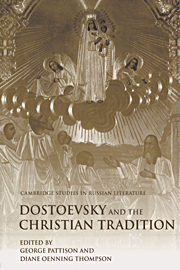Book contents
- Frontmatter
- Contents
- Notes on contributors
- Acknowledgments
- Notes on conventions and abbreviations
- Introduction: Reading Dostoevsky religiously
- PART I DOSTOEVSKY AND THE PRACTICE OF ORTHODOXY
- 1 Dostoevsky and the kenotic tradition
- 2 Dostoevsky's markings in the Gospel according to St John
- 3 Icons in Dostoevsky's works
- 4 Problems of the biblical word in Dostoevsky's poetics
- PART II DOSTOEVSKY AND CHRISTIAN THEOLOGY
- PART III READING DOSTOEVSKY RELIGIOUSLY: CASE STUDIES
- Bibliography
- Index
- CAMBRIDGE STUDIES IN RUSSIAN LITERATURE
2 - Dostoevsky's markings in the Gospel according to St John
Published online by Cambridge University Press: 02 December 2009
- Frontmatter
- Contents
- Notes on contributors
- Acknowledgments
- Notes on conventions and abbreviations
- Introduction: Reading Dostoevsky religiously
- PART I DOSTOEVSKY AND THE PRACTICE OF ORTHODOXY
- 1 Dostoevsky and the kenotic tradition
- 2 Dostoevsky's markings in the Gospel according to St John
- 3 Icons in Dostoevsky's works
- 4 Problems of the biblical word in Dostoevsky's poetics
- PART II DOSTOEVSKY AND CHRISTIAN THEOLOGY
- PART III READING DOSTOEVSKY RELIGIOUSLY: CASE STUDIES
- Bibliography
- Index
- CAMBRIDGE STUDIES IN RUSSIAN LITERATURE
Summary
Unlike his great contemporaries Turgenev and Tolstoy, whose early religious education was perfunctory, Dostoevsky was steeped in church life and Orthodox spirituality from an early age. His mother was a very devout woman who lived her short life according to the precepts of her faith. She was greatly loved by her children and inspired in her son Fyodor a lifelong sense of the living significance of the Bible and of the New Testament in particular. He accompanied his mother on her yearly pilgrimage to the great churches and monasteries in and around Moscow, and never forgot the profound impression the Lenten readings of the Old Testament Book of Job made on him. In a letter to his wife from Ems, dated 22 June 1875, when he was working on The Raw Youth, Dostoevsky wrote: ‘I am reading the Book of Job, and it provokes in me a sense of painful excitement <…> it was one of the first books to make a profound impression on me’ (29,11, 43). It influenced his whole thinking on a major theme in his work, that of innocent suffering, and key passages in The Raw Youth and The Brothers Karamazov are marked by this text.
However the most important spiritual experience of Dostoevsky's whole life – even during a youthful loss of faith in the sacramental life and mystical teaching of the Church – was his constant awareness of the figure of Christ, Whom he venerated throughout his life as both perfect Man and God. Christ for Dostoevsky was the incarnation of divine love for man and a teacher whose vision defines the writer's belief in absolute moral and spiritual values.
- Type
- Chapter
- Information
- Dostoevsky and the Christian Tradition , pp. 41 - 50Publisher: Cambridge University PressPrint publication year: 2001



